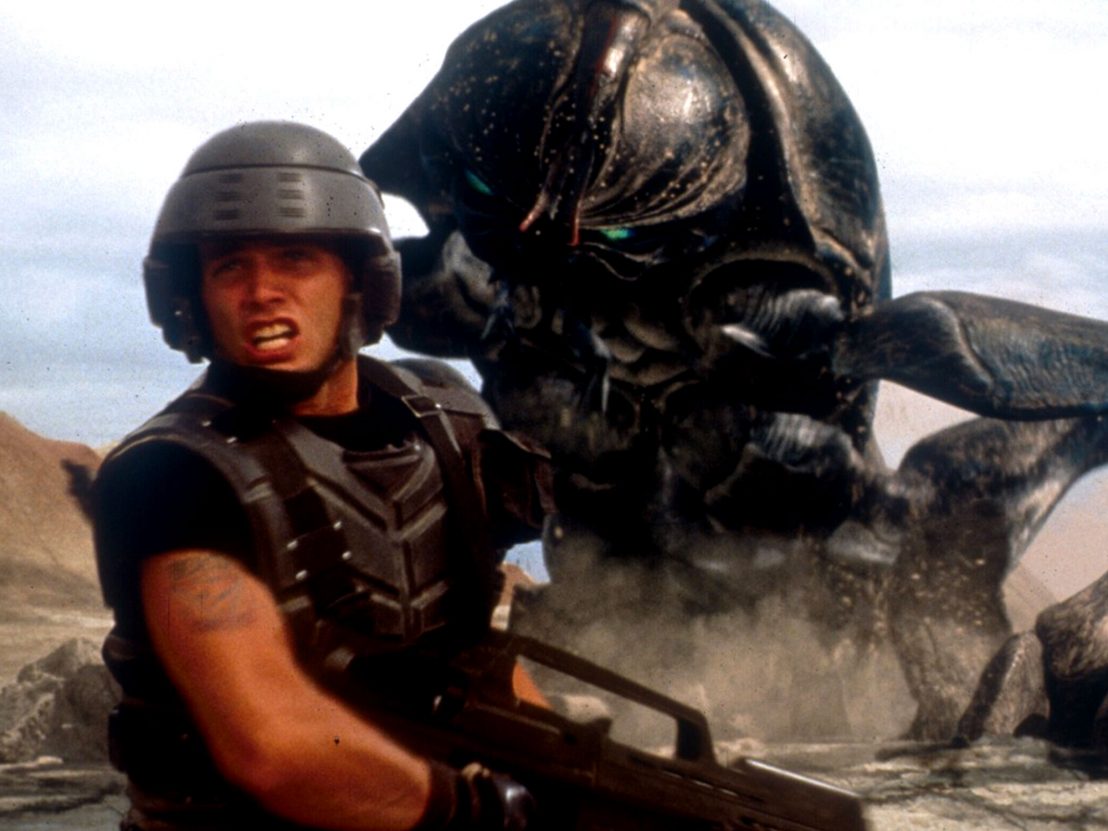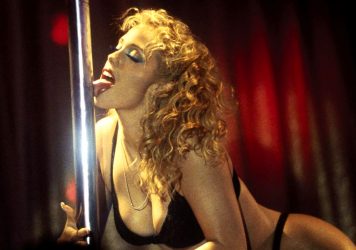
When a movie depicts evil, it usually tells us what to think about it. Take the infamous balcony sequence in Steven Spielberg’s 1993 film Schindler’s List, which opens with a shaky view of the murderous Amon Goeth (Ralph Fiennes). As he raises his rifle, pot belly protruding over the ledge from which he will soon begin nonchalantly picking off prisoners for pleasure, our perspective is from below the balcony and thus we are in a vulnerable position. By framing the action from this vantage point, Spielberg implicitly tells us that it’s okay, we are on the right side of history – Goeth is the monster.
Paul Verhoeven’s Starship Troopers, adapted from A Heinlein’s controversial 1959 novel, bears little resemblance to Schindler’s List. But when it comes to understanding the ways in which filmmakers help us to decode what we’re seeing, these films do have something in common. Released 20 years ago, Verhoeven’s sci-fi actioner was coolly received by critics and audiences at the time. And perhaps with good reason: the story is unremarkable, the crude dialogue wouldn’t be out of place in a toothpaste commercial, and the sets are largely unconvincing. Yet Starship Troopers did draw praise as a satire.
Faithful in its depiction of the earnest jingoism of Heinlein’s source novel, in recent years the film has been lauded by some commentators as a derisive caricature of right-wing militarism. This says more about liberal-minded sci-fi fans, however, than it does about Verhoeven’s movie, which treats its dubious subject matter without irony or any discernible self-awareness. The film’s universe unfolds in its intermittent newsreel sequences through blink-and-you’ll-miss-it references to Mormon extremists, crime reports where a murderer is captured, tried, sentenced and executed in a single day, and scenes of children playing with guns while heavily armed soldiers laugh like the wholesome family at the end of a board game commercial.
This sort of kitsch self-seriousness is standard in propaganda filmmaking. In an early scene, the charismatic teacher Jean Rasczak (Michael Ironside) instructs his students – some of them troopers-in-waiting – about the failure of democracy, the value of civic virtue and the moral supremacy of violence. For a moment it all seems strangely, disturbingly compelling. Or at the very least, normal. This is because the only logic the film allows is that of the world it depicts. When Dizzy (Dina Meyer) quips that her mother always says violence doesn’t solve anything, Rasczak replies decisively that, “naked force has resolved more issues in history than any other factor.” It’s the kind of comment you’d expect to read on an alt-right message board, and neither the dialogue, soundtrack, nor cinematography introduces any nuance with which to counter his glib riposte.
Unlike most films that present questionable points of view, Starship Troopers does nothing to create critical distance from them. Its artlessness makes it easily watchable and vulgarly entertaining, but if after sitting through two hours of rosy-cheeked fascist escapades we ask ourselves what it is we’ve enjoyed so much, an icky feeling sets in. Why else, two decades after it arrived in cinemas, would anyone have felt the need to defend the film they so loved in their youth by arguing how misunderstood it had originally been?
Verhoeven, with his back catalogue of quasi-exploitation fare, is no stranger to controversy. Yet it’s hard to say to what extent Starship Troopers was initially ‘misunderstood’ (if indeed this was the case at all). In the director’s defence he has said that “the secret to art is that it should be ambiguous.” Viewed today, there is no doubt about the film’s ambiguity. It exposes the suspect events and philosophy of Heinlein’s fictional universe on their own terms, without guiding our interpretation. Just like any other echo chamber, the film offers a singular message.
Although it is often appreciated as such years after the fact, propaganda isn’t art. It doesn’t demand reflection or deeper reading because it relies on our tendency to take the path of least resistance. In all its artless, tasteless militarism, Starship Troopers gives us faux-propaganda and no critical distance from it, and that’s what makes it so good. In various interviews and commentaries Verhoeven has said that he knew exactly what he wanted to do when he made the film, but then so did Heinlein when he wrote his social-Darwinian response to criticism of US nuclear weapons testing in the late 1950s, and Heinlein was not making satire.
Published 5 Nov 2017

By Nick Chen
From Showgirls to Starship Troopers, delve into the Dutch filmmaker’s provocative back catalogue.

By Alex Hess
The release of Con Air and Face/Off 20 summers ago marked a high-point in mainstream cinema.

By Matt Thrift
The outspoken Dutch filmmaker discusses his triumphant return to cinema, Elle.